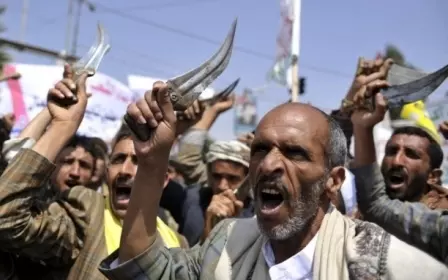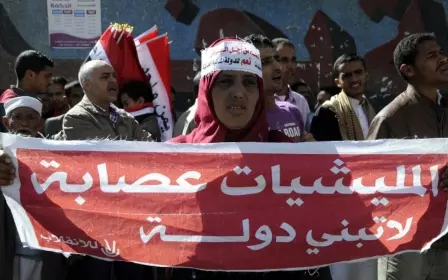ANALYSIS: Yemen chaos a counter-terrorism headache for Obama

NEW YORK - In September, Barack Obama was touting US drone strikes and counter-terrorism efforts in Yemen as a success in the global fight against Islamist militants. Crushing jihadists could be achieved by cooperating with foreign leaders, the US President said.
That policy is being stretched to its limits, after the Shiite Muslim Houthis completed taking the capital Sanaa last month and are now fighting militias supporting Abd-Rabbuh Mansour Hadi, the de jure president who the Houthis detained and forced to resign, in the south of the country.
John Bolton, America’s hawkish former UN ambassador, blasted Obama for allowing “something so profoundly important as the fall of Yemen”. Leon Panetta, former US Defence Secretary, decried “another failed state in the Middle East” and “giving al-Qaeda a free hand” in the region.
Under Hadi, the US was able to fly drones and had a partner in the fight against al-Qaeda in the Arabian Peninsula (AQAP), the Yemeni terror franchise that was allegedly behind last month’s deadly attack on the offices of French satirical newspaper Charlie Hebdo.
In contrast, the Houthis chant “death to America” in their mantra, have alleged links with Iran and resent a US drone campaign that kills Yemeni civilians.
“The wider strategic interest is AQAP, forming part of a pattern of global jihadism, not just in the Gulf but across this global crescent of Xinjiang in the northeast to Boko Haram and northern Nigeria in the West,” Kevin Rudd, former Australian Prime Minster, told Middle East Eye.
“This is an extraordinary phenomenon we see unfolding across the world.”
The US and some Europeans have closed embassies in Sanaa. US State Department officials describe a “challenging” diplomatic landscape. Pentagon spokesman Major Bradlee Avots told MEE: “We still have the capability to conduct counter-terrorism operations.”
Chaos in Yemen has reportedly left the US military unable to track some $400 million worth of helicopters, transport aircraft and other military gear it has supplied to Yemen since 2006. Major Avots refused to talk about stray hardware.
Barak Barfi, a scholar at the New America Foundation, a think tank, said US-supplied weapons remain largely in the hands of Yemen’s army – not the Houthis. The military remains strong in the south and capable of striking AQAP there, he said.
“Yemen’s military is largely intact, having remained in its barracks as the Houthis marched to the capital, and there is little evidence that the units that work with the Americans are loyal to the new rebel government,” Barfi told MEE.
“Suspending cooperation risks giving AQAP free rein in a country where it was able to wreak havoc even when bridled.”
In support of Obama’s strategy on Yemen, Charles Schmitz, a Towson University scholar, said Washington‘s approach to Ansar Allah, the Houthi fighting force, bridges US anti-terror goals with Yemen’s fast-changing political scene.
“Ansar Allah is an important political force in Yemen that will have a role in shaping the country’s future,” Schmitz told MEE. “Washington’s hope is that the closing of the foreign embassies will force Ansar Allah to negotiate more realistically with the rest of Yemen’s diverse political forces.
“US behaviour also reflects the common animosity it shares with Ansar Allah toward al-Qaeda.”
Another concern over the Houthi takeover is the group’s links to Iran, the regional Shiite heavyweight that backs Shiite groups across the Middle East in a power struggle against Saudi Arabia and the regional dominance of Sunni Muslims.
Senior Houthi officials deny Iranian backing, but Yemeni security officials have told Reuters that Houthi militiamen received weapons, money and training from Tehran as they made their initial advance on the capital in September.
“The relationship with Iran is a vastly exaggerated accusation that’s thrown by the Saudis. Riyadh has tried to suppress Houthi political influence in Yemen for years,” Pittsburgh University scholar Michael Brenner told MEE.
“Judging by the way the Houthis have governed Sanaa, we’re not dealing with a bunch of crazies here. The US can cooperate with the Houthis, but it will be on the terms of a group that criticises US intervention in Yemen and won’t be bullied.”
The UK-based pressure group, Amnesty International disagrees. Houthi fighters have detained and tortured civilians in a bid to weed out opposition in Sanaa and central Yemeni areas in their control, said the group’s crisis manager, Donatella Rovera.
“The international focus is on what political framework is acceptable to the various players, rather than the behaviour of those players. Human rights is not a major issue during negotiations in Sanaa or the UN Security Council, which is regrettable,” she told MEE.
UN Secretary General, Ban Ki-moon has warned of Yemen “collapsing before our eyes” and shortages of food, water and healthcare for 61 percent of the population – some 16 million people. Aid workers say worse is yet to come.
“So far we have not seen a significant humanitarian impact of the current political crisis, but we are concerned that a possible economic meltdown and fiscal breakdown will exacerbate an already critical situation,” Johannes Van Der Klaauw, the UN’s top humanitarian in Yemen, told MEE.
The UN Security Council on Sunday demanded Yemen’s Houthi militants relinquish control of the government and pull their forces from Sanaa. The Houthis blasted the UN for “meddling in internal affairs”. Yemen has been in turmoil since a popular uprising in 2011 forced longstanding President Ali Abdullah Saleh to step down one year later.
Middle East Eye propose une couverture et une analyse indépendantes et incomparables du Moyen-Orient, de l’Afrique du Nord et d’autres régions du monde. Pour en savoir plus sur la reprise de ce contenu et les frais qui s’appliquent, veuillez remplir ce formulaire [en anglais]. Pour en savoir plus sur MEE, cliquez ici [en anglais].




